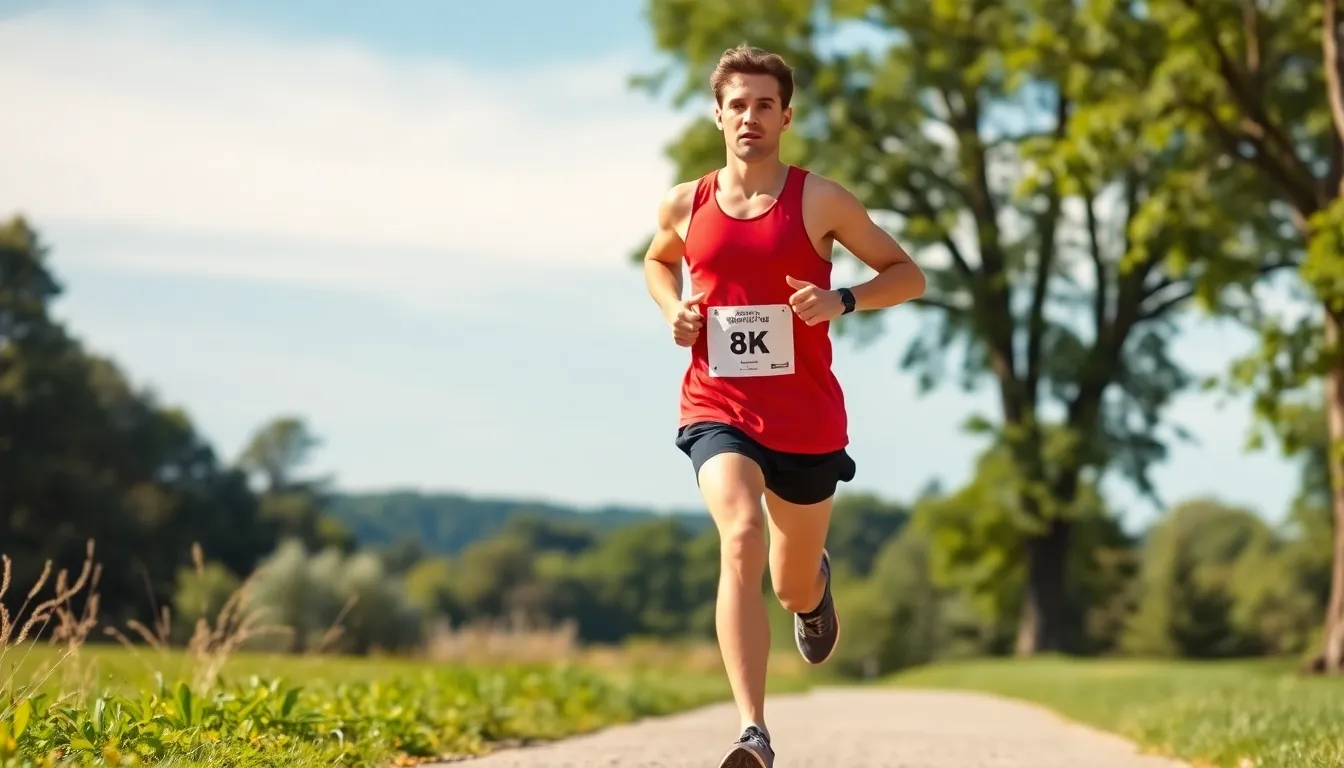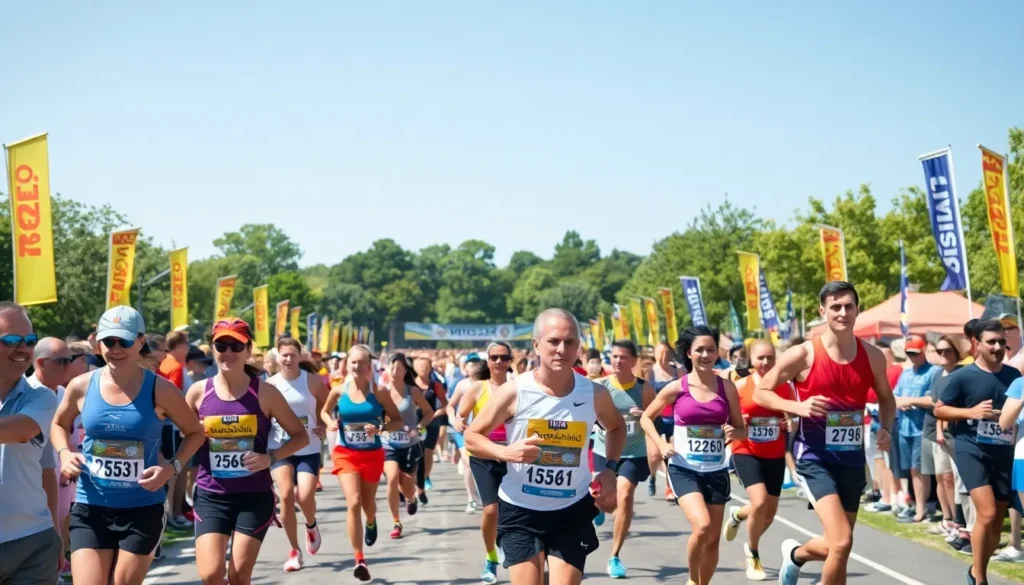Table of Contents
ToggleWhen it comes to running events, the numbers can get a bit confusing. One minute, you’re training for a 5K, and the next, you’re facing an 8K. So, how many miles is an 8K? Spoiler alert: it’s not as complicated as your last relationship. An 8K race measures approximately 4.97 miles, which is just shy of that elusive 5-mile mark.
Understanding the 8K Distance
An 8K race measures approximately 4.97 miles, placing it just short of the 5-mile mark. Participants in these events often find the distance manageable yet challenging. Many training programs recognize the 8K as a pivotal stepping stone for runners transitioning from shorter distances like 5Ks.
Runners frequently view the 8K as an opportunity to build endurance. This race offers a balance, providing a longer distance without the intensity of a 10K or a half marathon. Athletes may develop their pacing strategies and increase their stamina through consistent training.
In terms of preparation, a typical training plan spans several weeks. Individuals might include interval runs, long runs, and recovery days to enhance their performance. Nutrition also plays a key role; proper fueling can significantly impact race day outcomes.
Weather conditions can influence race times and runners should be prepared for various elements. Strategic planning for race day, including hydration and warming up, can optimize performance. Familiarity with the racecourse often helps ease pre-race anxiety.
Overall, understanding the distance and preparing adequately ensures a positive experience during the 8K. Such events not only test physical limits but also forge a sense of community among participants.
Converting Kilometers to Miles

Converting kilometers to miles is essential for understanding distance in running events. An 8K race measures 8 kilometers, equating to approximately 4.97 miles. This conversion simplifies discussions about race preparation and pacing strategies.
The Basics of Conversion
Using a straightforward formula makes the conversion clear. One kilometer equals about 0.621371 miles. To convert kilometers to miles, multiply kilometers by this factor. For example, multiplying 8 kilometers by 0.621371 yields nearly 4.97 miles. Familiarity with this conversion helps runners better understand distances when planning training and races.
Useful Conversion Factors
Several key conversion factors aid in distance understanding. Two significant values include 1 kilometer equals 0.621371 miles and 1 mile equals 1.60934 kilometers. Using these, converting multiple distances becomes manageable. To convert longer distances like 10K to miles, simply multiply by the conversion factor. Knowing these factors supports accurate distance assessment in various running scenarios.
The Significance of the 8K Race
The 8K race holds an important place in the running community. It’s a popular distance that strikes a balance between challenge and accessibility for many runners.
Popularity in Running Events
The 8K race has gained traction in recent years, often featured in various running events and community races. Runners appreciate this distance for its manageable length, serving as a bridge between a 5K and longer races. Many local races incorporate 8K options, attracting participants of different skill levels. Increased marketing and social media promotion have also contributed to its rising popularity, encouraging more individuals to join running groups and charity events centered around this distance. Overall, the 8K race continues to expand its reach, fostering camaraderie among runners.
Health Benefits of Participating
Engaging in 8K races offers numerous health benefits. Improved cardiovascular fitness ranks high among the advantages, as running regularly enhances heart and lung function. Building endurance over this distance supports weight management, promoting a healthier lifestyle. Participants often report enhanced mental health, as physical activity releases endorphins that reduce stress and anxiety. Lowering the risk of chronic diseases, such as diabetes and hypertension, also plays a role in its appeal. By training for an 8K, individuals embrace a structured routine that positively impacts both physical and mental well-being.
Training for an 8K
Training for an 8K focuses on building endurance and strength while developing effective pacing strategies. Runners engage in varied workouts to improve their overall performance.
Ideal Training Regimens
Incorporating a mix of long runs, interval training, and recovery days enhances performance. Long runs build endurance, while intervals boost speed and stamina. Recovery days help muscles heal and prevent injuries. Training schedules often span 8 to 12 weeks, allowing gradual distance increases. For example, starting with 2 to 3 miles, runners can progressively add half a mile each week. Cross-training activities like cycling or swimming can also support overall fitness without overloading running muscles. With a balanced regimen, runners prepare effectively for the 8K distance.
Tips for New Runners
Establishing a strong foundation is crucial for new runners tackling an 8K. Setting realistic goals helps maintain motivation and focus. Joining a running group can foster camaraderie and accountability. Gradually increasing mileage protects against injuries while enhancing fitness levels. Listening to the body becomes essential; any signs of pain indicate a need for rest. Practicing proper hydration and nutrition elevates performance and recovery. Familiarizing with the racecourse offers advantages, easing pre-race anxiety. By ensuring these elements, new runners set themselves up for a positive racing experience.
Common Questions About 8K Races
Runners often wonder about the time it takes to complete an 8K race. On average, completion times range from 30 to 60 minutes, depending on skill level and training.
Many ask about pacing strategies for an 8K. Maintaining a steady pace that aligns with one’s endurance capacity remains crucial for optimal performance.
Questions frequently arise regarding necessary gear for 8K races. Comfortable running shoes designed for long-distance running, moisture-wicking clothing, and accessories like hats or sunglasses play important roles in ensuring a pleasant race experience.
Run participants also inquire about the best pre-race meal. A balanced meal rich in carbohydrates and moderate protein consumed two to three hours before the event fuels energy reserves effectively.
Concerns about post-race recovery often lead to inquiries as well. Engaging in gentle stretching, consuming protein-rich foods, and staying hydrated aids significantly in recovery after the race.
Questions on race etiquette frequently surface among newer runners. Following race guidelines, being mindful of fellow participants, and respecting personal space during the run support a positive event atmosphere.
Heedful participants consider weather conditions for race day. Adjustments in attire and hydration strategies become necessary for varying temperatures and humidity levels.
Finally, new runners ask how to measure race readiness. Assessing training consistency, confidence in pacing strategies, and comfort with the racecourse signifies one’s preparedness for the challenge ahead.
Understanding these aspects can significantly enhance the 8K race experience, fostering success and enjoyment on race day.
The 8K race stands out as an ideal distance for runners looking to challenge themselves while still feeling achievable. With its approximate length of 4.97 miles, it serves as a perfect transition from shorter races to longer events.
Training effectively for an 8K requires a balanced approach that includes endurance building, pacing strategies, and attention to nutrition. Familiarity with the racecourse and understanding weather conditions can also play a significant role in performance.
By embracing the journey of preparing for an 8K, runners not only enhance their physical fitness but also cultivate a supportive community. This distance offers a unique blend of challenge and camaraderie, making it a popular choice for both novice and seasoned athletes alike.





